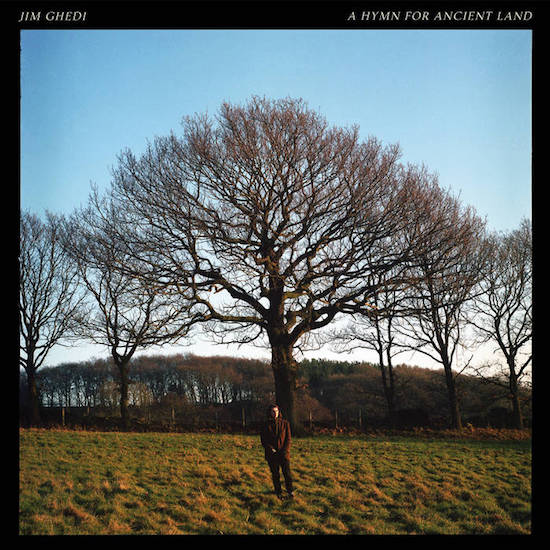The combination of gorgeous fingerpicking, verdant orchestration and heartfelt songwriting on A Hymn For Ancient Land can feel like a welcome antidote to the haughty irony of much of today’s alternative music. At other times, the genteel emotional register of the compositions and bucolic ambience of the track titles gives off an air of pastoral kitsch – a rose-tinted view of nature and folk music that feels strangely both naive and carefully constructed. Taken as a whole, this makes for an album filled with inventive guitar work that is occasionally hampered by over-egged production and sentimental arrangements.
12-string player Ghedi is a prominent name on a current scene of underground fingerstyle guitarists in Britain that includes the likes of Nick Jonah Davis and C Joynes. His 2015 album Home Is Where I Exist, Now To Live And Die weaved in occasional snatches of sampled ambience and field recordings, but the real star of the show was his guitar playing. Beholden to both the traditions of American primitive and British folk baroque, with a feeling of freshness derived from the compositions themselves, he was by turns amiably freewheeling and desperately yearning.
On this latest, though, he’s beefed up his guitar compositions with a whole host of instrumental embellishments – string sections, brass, percussion, piano, harmonium and more – and on two tracks he also sings. The drawbacks of these new developments can be felt most keenly on one of those tracks, ‘Banks of Mulroy Bay’. This take on an Irish trad song opens with some frostbitten pastoral jazz noodling on the piano but when the lyrics kick in, the sense that Ghedi is new to singing becomes unavoidable; the accentuated idiosyncrasies in his delivery give you the feeling that he’s trying too hard to carve out a distinctive voice for himself. Mixed with the epic chords and weeping strings, it makes for a saccharine stew.
But beyond the oversentimentality, there is much to enjoy here – particularly when rougher edges emerge in the production. In the scraping, metallic tones that open ‘Phoenix Works’ or the faraway, dripping piano tinkles that bookend ‘Home for Moss Valley’, you glimpse something similar to the liminal agrarian sonics that make Talk Talk’s Spirit of Eden such an engrossing work. ‘Bramley Moor’, meanwhile, is an example of where the expanded instrumental lineup can work in Ghedi’s favour, with cello, slide guitar and sticks furrowing together to create a lush thrum. Similarly on album closer ‘Sloade Lane’, a trumpet and cello weave round Ghedi’s guitar figures, creating moments of emotive beauty in the track’s descending main theme.
There are moments when Ghedi creates a palpable threat. See, for example, how the music box prettiness of ‘Cwn Elan’ is offset by the plangent, searching aura of ‘Fortingall Yew’, the album’s most harmonically complex and melodically worrisome piece – and its most emotionally involving. It’s nice to see a guitarist maintaining a healthy relationship to influences, too. There are audible references to past masters – namely Robbie Basho’s ‘Variations On Easter’ in ‘Home For Moss Valley’ and John Fahey’s ‘Sunflower River Blues’ in ‘Bramley Moor’ – but Ghedi has a style that is intensely rhythmic without aping the thumb picking of the American primitives.
Ghedi’s view of the countryside is a pastoral one – only on ‘Phoenix Works’, a song dealing with the decline of traditional industries in the north, does he explicitly deal with darkness. This, coupled with the dense, meandering tonalities of ‘Fortingall Yew’, saves the album from being a landscape painting. There’s a fine line between heartfelt and mawkish, and on A Hymn For Ancient Land Ghedi stays on the right side of it – but only just.


